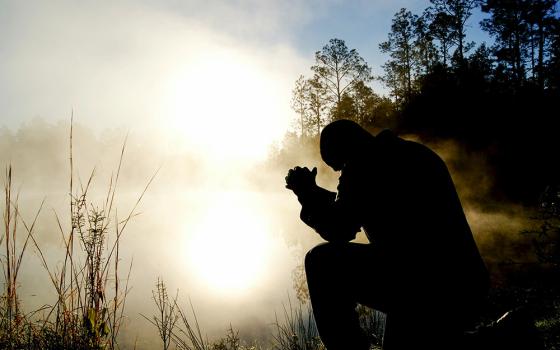Did you know that the United States Conference of Catholic Bishops has a secretariat (and I am not making this up) "of clergy, consecrated life and vocations"?
If you think that's a mouthful, listen to its director, Fr. David Toups, discussing with New York Times reporter Paul Vitello the screening process U.S. seminaries have been using since the sex abuse crisis erupted, not only to screen out potential molesters but also, under complex recent guidelines from the Vatican, to keep gay men out of the priesthood.
Toups says, "The best way I can put it, it's not black and white. It's more like one of those things where it's hard to define, but 'I know it when I see it.'" (See: Prospective Catholic Priests Face Sexuality Hurdles)
Is it revealing, astounding, or scandalizing that an ecclesiastic should describe his discernment of gay vocation prospects like a one-eyed pilot looking for a landing field somewhere in the Bermuda Triangle? Or to use, "I know it when I see it," words famous for their use in Supreme Court arguments identifying pornography?
No wonder the Wall Street Journal recently headlined a story, "Church Response to Abuse Scandal Lacking a Clear Plan."
Were Vatican officials clear when they famously described homosexuality as a "disorder" and decreed that, sorry, but no priesthood for gays, no sexual life either, and, under Pope John Paul II, a curtailment of church pastoral outreach to them. While some militant gays protested flamboyantly in St. Patrick's Cathedral many years ago, the majority, who look just like you and me sitting in the pews, felt rejected by the church.
In 2005, the Vatican forbade accepting a candidate who "actively practice homosexuality." In 2008 the Vatican's Congregation for Catholic Education said that it wasn't enough "to be sure that he is capable of abstaining from genital activity," but it "is also necessary to evaluate his sexual orientation."
But how, seminary officials asked, was that understood or assessed? Mr. Vitello reports that screening programs are "increasingly standard" in barring gays from seminaries. Examiners now ask questions professionally appropriate in taking a sexual history for treatment purposes, but they are hardly justified, prudent, or perhaps even ethical to ask, as the Times reports, "When was the last time you had sex?," The "preferred answer" is "not for three years or more," but why is this preferred and perhaps the examiners and uncounted married men would give the same answer?
There isn't much clear thinking in condoning such inquiries as "What kind of sexual experiences have you had?" Asking "Do you like pornography" sounds like the old confessional dialogue -- I had impure thoughts -- Did you entertain them? -- No, they entertained me.
There is not much professional subtlety in querying, "Do you like children more than people your own age?" or, in the great Vatican I reprise of how the candidate handles sexual urges, "Do you take cold showers, Do you take long runs?" One psychologist, sounding like an inquisitor boasting of his skill with the turn screws, claims, "We have no gay men in our seminary at this time."
The Condescension Award goes to the vocations director who denies a witch hunt is underway but adds with enough unction to anoint all Manhattan, "We do not think that homosexuals are bad people. But it has to do with our view of marriage. A priest can only give his life to the church in the same way that a man gives his life to his female spouse. A homosexual man cannot have the same relationship. It's not about condemning anybody. It's about our world view."
Such preposterous theologizing is far more responsible for the sex abuse crisis than permitting homosexuals to serve as priests. Thousands of mature gay men possess the one true qualification for the priesthood and it transcends sex, gender, or wacky theological ideas -- the ability to make healthy relationships with other people.
Ask lay people who pick this up right away. Turn all recruitment over to them immediately. They know who is healthy and who is not and they would quickly replace the question of whether we should keep gays out of the priesthood with a better one -- Who let so many immature, self-centered lovers of Vatican I vestments and clerical privilege into the priesthood?
[Eugene Cullen Kennedy is emeritus professor of psychology at Loyola University, Chicago.]
Editor's Note: We can send you an e-mail alert every time Kennedy's column, Bulletins from the Human Side," is posted to NCRonline.org. Go to this page and follow directions: E-mail alert sign-up. If you already receive e-mail alerts from us, click on the "update my profile" button to add Kennedy to your list.



